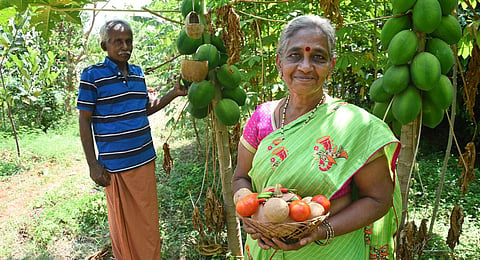The green couple
CHENNAI: The sun had set and the light from the full moon shone brightly on a house in Pooluvappatty, Coimbatore. Following the moonlight, we reach outside Sai Murali’s house. It is 7 pm. Murali and his wife Meera are seated on the staircase, enveloped in darkness. Welcoming us, Meera says. “We live a sustainable life. We opted to not use electricity two months back. We finish our dinner by 7 pm and sit on the staircase till we decide to sleep.” But when a guest comes home, Murali offers to switch on the light. He did so for us too but we humbly rejected, deciding to experience a bit of sustainable living.
In love with nature
Sitting in the dark, the sexagenarians begin sharing their sustainable stories. “I grew up in Mumbai and the concept of sustainability was inculcated in me since my childhood. I had a small garden in the balcony of my house where I harvested a few greens for the family. It was always my dream to surrender myself to nature and live in a village. This came true in 2005,” says 60-year-old Meera. A nature-lover, Meera worked in NABARD in Mumbai for 22 years. In her free time, she worked with farmers and understood the need for farming.
“At the age of 45, I took voluntary retirement from my job. I then shifted to Vaangal village in Karur where my husband was doing business,” she says. There, she planted mango, brinjal, pumpkin, guava other trees around her house and started living the village life. She also helped the local farmers by creating awareness on government schemes and provided free tuition for children.
As the years progressed, her belief in nature kept getting stronger. Meera also did the Siddha Samadhi yoga course in 2000 and learned more about naturopathy. “Thirty years ago, when my daughter was suffering from scalp wounds, I took her to the doctor. He gave her medicines, but I chose to apply freshly ground neem leaves on her scalp for two days. She also consumed a pea-sized neem paste every day. The wound reduced drastically. From then on, I started depending on nature,” she says.
The couple shifted to Coimbatore in 2010 and planted many herbs and trees in one acre of land around their house. They get saplings from their friends and nurseries. “We have trees like guava, mango, jackfruit, jamun, star fruit, gooseberry, plantains, brinjal, breadfruit, ivy gourd, red gram, tomato, cluster beans, even medicinal plants like thoothuvalai, tulsi, pirandai (veld grape), aloe vera, pepper and many varieties of spinach,” says 63-year-old Murali.
Baby steps
Sustainability is a step-by-step process and the couple also took it slow from 2010. They first replaced their toothbrush with twigs of neem trees, guava tree, mango tree, and used them with homemade tooth powder. Then they replaced bathing soap with a ground powder of avaram poo, tulsi, neem, kuppaimeni, lemon and orange peels, and rose petals. Meera also makes bio enzyme at home for washing vessels, clothes, cleaning floors and toilets. “We both travel to attend workshops on farming and sustainability. We learned to make these products from workshops,” he adds.
Soon after, they again turned to their farm to replace vessels and home decor. They have a beggar bowl tree and the hard shell of the fruit is used as a serving bowl, roof hangings, plant holders and stands. “Now we spend money on our travel and for other necessary expenditure,” says Meera, showing us around the farm.
The couple has also changed their diet. They quit eating rice and wheat five years ago. In the morning, they drink curry leaf juice mixed with coconut and banana for breakfast. “We eat vegetables harvested from the farm and cook it using the One Pot One Shot (OPOS) method,” says Meera.Meera and Murali are engaged in farming full-time. “We plan to construct a bio-toilet with materials available from the farm. It saves water, and human waste can be used as manure for the plants,” says Murali.

